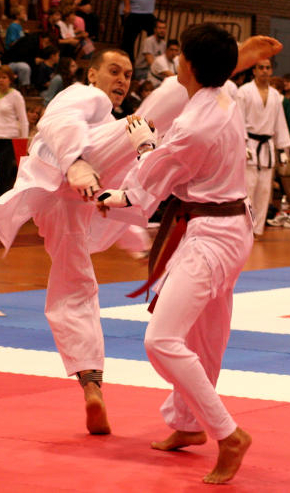About ESKA
Constitution | Championship Rules

ESKA was formed at a meeting in Ghent, Belgium in February 1986. Its formation was based on the desire to promote and develop traditional shotokan karate throughout Europe and to provide the opportunity for European nations to compete against each other at the highest level.
ESKA has become a reference for traditional Shotokan karate in Europe and is responsible for the maintenance and development of ever higher standards of Shotokan karate based on those set by the late Sensei Masatoshi Nakayama.
Each of the members of ESKA are national voluntary organizations which practice Shotokan Karate within their own countries, comply with the rules and regulations of ESKA, and are accepted as members by the ESKA Congress. ESKA recognizes only one member organization for each country.
ESKA is a non profit making organization and does not engage in matters pertaining to race, religion or politics. It is a democratic body and all member countries are invited to participate by sending teams, individual competitors, qualified officials and congress delegates to the championships, courses and annual congress.
Since the first championships, which were held in Sunderland in 1986, ESKA has held a championships every year. To date 14 different nations have hosted the event.
The annual championships are characterized by the high technical standard of karate, the fiercely competitive nature of matches on the tatami, and the camaraderie and good sportsmanship which exists between participants.
Constitution
A full copy of the Constitution of ESKA may be obtained on request from the General Secretary. The following are some extracts from the Constitution. The aim of ESKA is to:
- develop traditional Shotokan Karate-do in Europe by promoting and strengthening friendly relations and collaboration amongst its membership;
- become a reference point for traditional Shotokan Karate in Europe;
- maintain and develop standards of traditional Shotokan Karate in Europe (in this matter 'traditional Shotokan Karate' refers to the definition of Karate as documented by Nakayama Masatoshi in his book-series 'Best Karate').
Communication with ESKA should be addressed to the Secretary-General.
The members of ESKA are national voluntary organisations which practice Shotokan Karate in their own countries, comply with the rules and regulations of ESKA and are accepted as members by the ESKA Congress.
ESKA recognises only one member organisation for each European country as its member organisation. However, organisations in the dominion or colonies of certain countries may be recognised as an independent member organisation upon recognition by the Congress of the ESKA.
An organisation intending to become a member of ESKA will make an application for membership to ESKA.
The Congress of ESKA is composed of the members of ESKA. Congress in ESKA has the authority to:
- modify the Constitution;
- nominate, elect, authorise and dismiss members of the Executive Board;
- nominate, elect, authorise and dismiss auditors;
- approve the annual financial report and the annual budget;
- ratify the transfer to Congress of both responsibility and liability from the Executive Board, its members and the auditors;
- dissolve ESKA;
- expel a member;
- take decision in all cases unforeseen by the Constitution.
In addition, Congress has the authority to nominate an individual for the position of president of ESKA from amongst the members of the Executive Board.
The Executive Board has the authority to:
- execute the mandates received from Congress;
- govern and to manage ESKA;
- represent ESKA;
- take all necessary actions which are not assigned by the Constitution to Congress or any other body of ESKA;
- take decision in all cases not foreseen by the Constitution.
The Executive Board has the authority to delegate part of its duties to internal executing bodies. The extent of the delegation has to be clearly defined by a decision of the Executive Board. Delegation does not absolve the Executive Board of its responsibilities to Congress or third parties. At any time the Executive Board can withdraw any delegation.
Championship Rules
The rules for all ESKA Championships may be downloaded in PDF format.
